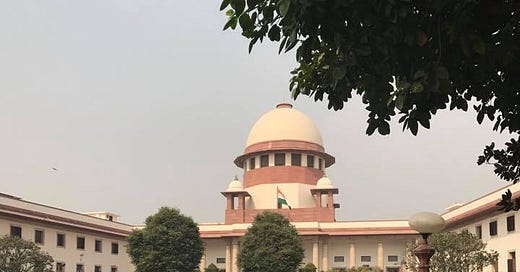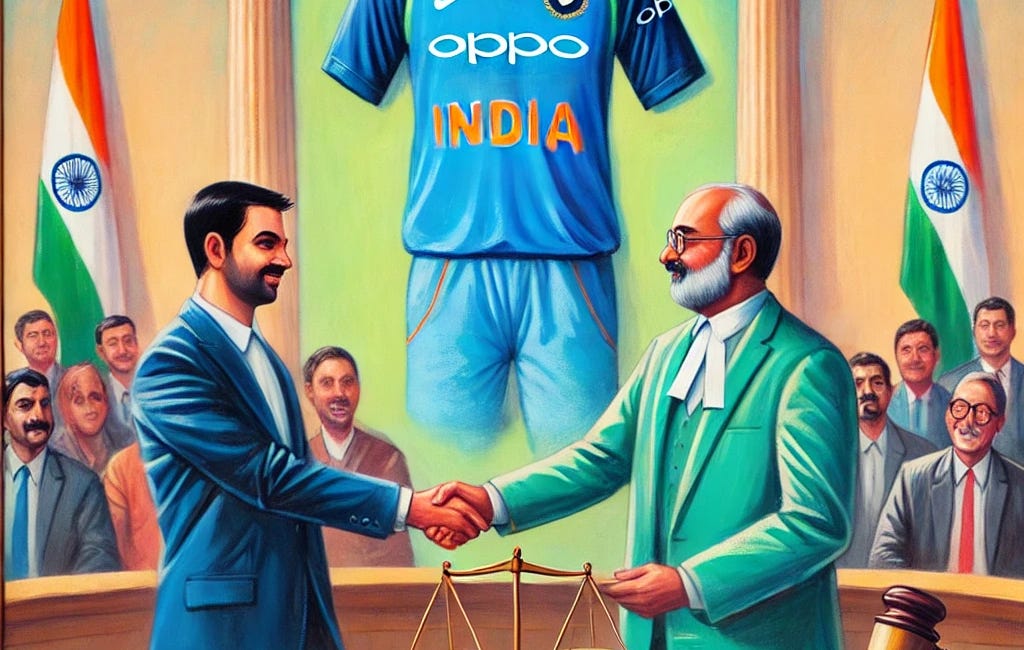Supreme Court Sets Aside NCLAT Order on Byju's-BCCI Settlement
The Supreme Court also ordered that the ₹158 crore initially meant for BCCI be placed in an escrow account managed by the Committee of Creditors (CoC).
Supreme Court Overturns NCLAT Decision on Byju's-BCCI Settlement
On Wednesday, 23 October, the Supreme Court of India set aside a decision by the National Company Law Appellate Tribunal (NCLAT) that had approved a settlement between the embattled Byju's, the ed-tech giant, and the Board of Control for Cricket in India (BCCI). The settlement, involving a ₹158 crore payment from Byju's—now teetering on the brink of bankruptcy—to clear its outstanding dues with BCCI, had effectively stalled the insolvency proceedings initiated by the National Company Law Tribunal (NCLT) under the Insolvency and Bankruptcy Code (IBC) qua other creditors1.
Procedural Flaws and Misuse of Powers
The three-judge bench, presided over by Chief Justice of India D Y Chandrachud and comprising Justices J B Pardiwala and Manoj Misra, found significant procedural flaws in NCLAT’s handling of the case. The court ruled that NCLAT had erred in invoking its inherent powers under Rule 11 of the NCLAT Rules, despite the presence of a clear legal procedure governing the withdrawal of the Corporate Insolvency Resolution Process (CIRP). The Supreme Court noted that no application for withdrawal had been filed, and none of the statutory requirements had been met.
The Court's Observations
The Supreme Court highlighted that when the parties attempted to place the settlement on record on 31 July 2024, the Committee of Creditors (CoC) had not yet been constituted, although CIRP had already commenced. The bench emphasised that the legal framework mandates that any withdrawal of CIRP must be done through a formal application submitted by the Interim Resolution Professional (IRP) and subsequently approved by the NCLT, none of which occurred in this case.
Directions to CoC
Setting aside the NCLAT's order, the Supreme Court directed that the ₹158 crore, along with any accrued interest, be deposited with the CoC. The court instructed that this amount be maintained in an escrow account until further legal developments, ensuring that the interests of all stakeholders are protected and that due process is followed in the ongoing insolvency proceedings.
Background
Insolvency Proceedings Initiation: The insolvency proceedings against Byju's were initiated by the NCLT following a plea from BCCI, seeking payment of its dues. NCLT ordered the commencement of the Corporate Insolvency Resolution Process (CIRP).
Settlement Approval by NCLAT: On August 2, 2024, NCLAT approved the settlement between Byju's and BCCI, which included a ₹158 crore payment. This approval was granted even before the formation of a Committee of Creditors (CoC), a crucial step in the insolvency process2.
Objections and Appeal: GLAS Trust Company LLC, a US-based financial creditor, objected to the settlement, citing concerns over the source of funds used and arguing that the settlement procedures were not properly followed. They alleged that the funds involved were part of missing assets, adding to their grievances.
Analysis of Supreme Court's Decision
The Supreme Court identified several procedural irregularities in the NCLAT's handling of the case:
Procedural Deviations: The Supreme Court highlighted that no formal application was filed for the withdrawal of CIRP. Instead, the NCLAT approved the settlement based on affidavits and submissions, bypassing the prescribed procedures.
Improper Use of Inherent Powers: NCLAT had invoked its inherent powers under Rule 11 of its rules to approve the settlement, skipping the proper legal channels. The Supreme Court reprimanded this approach, stressing that inherent powers should not be used to bypass established legal processes.
Impact on Creditors: The decision impacted other creditors, particularly financial creditors like GLAS Trust Company LLC, whose repayment should have been prioritised under IBC guidelines. The Supreme Court underscored the necessity of protecting creditors' rights by following due process.
Outcome
As a result of the Supreme Court's ruling, the insolvency proceedings against Byju's have been reinstated. The Supreme Court also ordered that the ₹158 crore initially meant for BCCI be placed in an escrow account managed by the CoC. This ruling, which cannot but be seen as a significant setback for the BCCI, reinforces the importance of following procedural guidelines in insolvency cases and ensures that the rights of all creditors are considered before any settlement inter se the company under liquidation and a particular creditor can be approved in isolation.
Sources
[1] Supreme Court sets aside NCLAT order stopping insolvency process against Byju’s
[2] Supreme Court sets aside NCLAT order halting Byju's insolvency proceedings
[3] SC sets aside NCLAT order on Rs 158-crore settlement of Byju's with BCCI
[4] Byju’s insolvency case: Supreme Court sets aside NCLAT decision
[5] Supreme Court sets aside NCLAT order stopping insolvency proceedings against Byju’s: A timeline of the case
Byju's: From Edtech Giant to Financial Crisis – The Road Ahead
Byju's: From Edtech Giant to Financial Crisis






